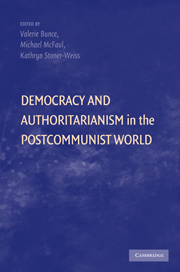Book contents
- Frontmatter
- Contents
- Prologue
- PART I WAVES OF REGIME CHANGE: FROM DICTATORSHIP TO DEMOCRACY…AND BACK?
- PART II ENCOURAGING DEMOCRACY: THE ROLE OF THE EUROPEAN UNION
- PART III CHOOSING REGIME CHANGE: DEMOCRATIZING ELECTIONS
- 5 A Postcommunist Transition in Two Acts
- 6 Defining and Domesticating the Electoral Model
- 7 Georgia's Rose Revolution
- 8 Importing Revolution
- PART IV RESISTING REFORM: BACKSLIDING DEMOCRACIES AND ENDURING AUTOCRACIES
- Epilogue
- Index
- References
8 - Importing Revolution
Internal and External Factors in Ukraine's 2004 Democratic Breakthrough
Published online by Cambridge University Press: 05 June 2012
- Frontmatter
- Contents
- Prologue
- PART I WAVES OF REGIME CHANGE: FROM DICTATORSHIP TO DEMOCRACY…AND BACK?
- PART II ENCOURAGING DEMOCRACY: THE ROLE OF THE EUROPEAN UNION
- PART III CHOOSING REGIME CHANGE: DEMOCRATIZING ELECTIONS
- 5 A Postcommunist Transition in Two Acts
- 6 Defining and Domesticating the Electoral Model
- 7 Georgia's Rose Revolution
- 8 Importing Revolution
- PART IV RESISTING REFORM: BACKSLIDING DEMOCRACIES AND ENDURING AUTOCRACIES
- Epilogue
- Index
- References
Summary
The fall 2004 Ukrainian presidential election led to one of the seminal moments in that country's history. Initially, the campaign and election results resembled other tainted and fraudulent votes in semiauthoritarian regimes around the world. The incumbent president, Leonid Kuchma, and his chosen successor, Prime Minister Victor Yanukovych, deployed all available state resources, national media, and private funding from both Ukrainians and Russians to defeat the opposition candidate, Victor Yushchenko.
When this effort to win the vote failed, Kuchma's government tried to steal the election, allegedly adding more than 1 million extra votes to Yanukovych's tally in the second round of voting held on November 21, 2004. In response to this perceived fraud, Yushchenko called upon his supporters to come to the Maidan, the Independence Square in Kyiv, and protest the stolen election. First thousands, then tens of thousands, then hundreds of thousands answered his call. They remained on the square, with some living in a tent city on Khreshchatyk, Kyiv's main thoroughfare, until the Supreme Court annulled the official results of the second round on December 3, 2004 and set a date for the rerunning of the second round for December 26, 2004. In this vote, Yushchenko won fifty-two percent of the vote, compared to forty-four percent for Yanukovych. Although most domestic and international observers declared this third round of voting to be freer and fairer than the fist two, Yanukovych nonetheless contested the results in the courts, but with no success.
- Type
- Chapter
- Information
- Democracy and Authoritarianism in the Postcommunist World , pp. 189 - 226Publisher: Cambridge University PressPrint publication year: 2009



